| | | | | | | | | | | Axios World | | By Dave Lawler ·Jan 27, 2022 | | Welcome back to Axios World. - Heads-up: We're taking the next two weeks off while I go on a belated (domestic) honeymoon. I'll be back in your inbox on Feb. 14 after some sunshine and some skiing.
- If big news happens before then, as seems pretty likely, my colleagues will have you covered. Tonight's edition (1,835 words, 7 minutes) gets you up to speed on the Ukraine crisis.
| | | | | | 1 big thing: Biden and Zelensky differ on "imminence" of Russian threat |  | | | Biden and Zelensky at the White House last October. Photo: Brendan Smialowski/AFP via Getty | | | | President Biden and Ukrainian President Volodymyr Zelensky had a back-and-forth in their call this evening about just how "imminent" the threat of a Russian invasion might be, according to three sources briefed on the call. Why it matters: Biden has said previously that he believes Vladimir Putin will probably "move in" to Ukraine, and press secretary Jen Psaki said just this afternoon that "an invasion could come at any time." - The Ukrainian government, which is worried about the effects of such statements on the economy and public morale, has been contending that the threat of an invasion is real but not any higher than in previous months.
Behind the scenes: When Zelensky raised the White House warnings of an "imminent" threat, Biden pointed to the possibility that Russia will invade once the ground freezes, and he said that's why the U.S. is sending so much weaponry. - The three sources disagreed on the exact language Biden used. The White House has denied a CNN report that Biden said an invasion was "virtually certain," but said he reiterated the distinct possibility Russia would invade in February.
State of play: While the White House is continuing to seek a diplomatic off-ramp, the Kremlin signaled today that the security proposals formally presented yesterday by the U.S. and NATO don't address Russia's "fundamental" concerns. - Moscow has said that if its demands aren't met, it will opt for a "military-technical" solution, but denies any intention to invade Ukraine.
- While there's a growing consensus among close watchers of Russia's military that some sort of escalation is likely soon, the debate continues as to whether Russia would opt for smaller operations to destabilize Ukraine or a full-scale invasion toward the capital, Kyiv.
Russia's rapid movement into Belarus — which NATO Secretary-General Jens Stoltenberg said Wednesday was taking place "under the disguise of an exercise" — has convinced some analysts that Putin is planning a major invasion. - Konrad Muzyka, a defense analyst focusing on Russia and Belarus, tweeted today that, with 10 army groups now positioned at various points near Ukraine's borders, this would have to be the largest exercise in Russia's modern history.
- And while some analysts contend Russia has only assembled enough troops for a limited incursion, Rob Lee, a former U.S. Marine officer and an authority on Russia's military capabilities, believes Russia now has the necessary equipment in place for a full-scale invasion and could fairly quickly send the troops to man it.
What's next: Michael Kofman, an expert on Russia's military at CNA, tells Axios the movements of Russian troops and equipment suggest preparations for a large-scale military operation. - He estimates that it could take about three to four weeks to have the various pieces in place, based on current deployments, though Moscow could opt for a "rolling start" to its operations before then, including potential cyberattacks or missile strikes.
|     | | | | | | 2. What an invasion might look like | 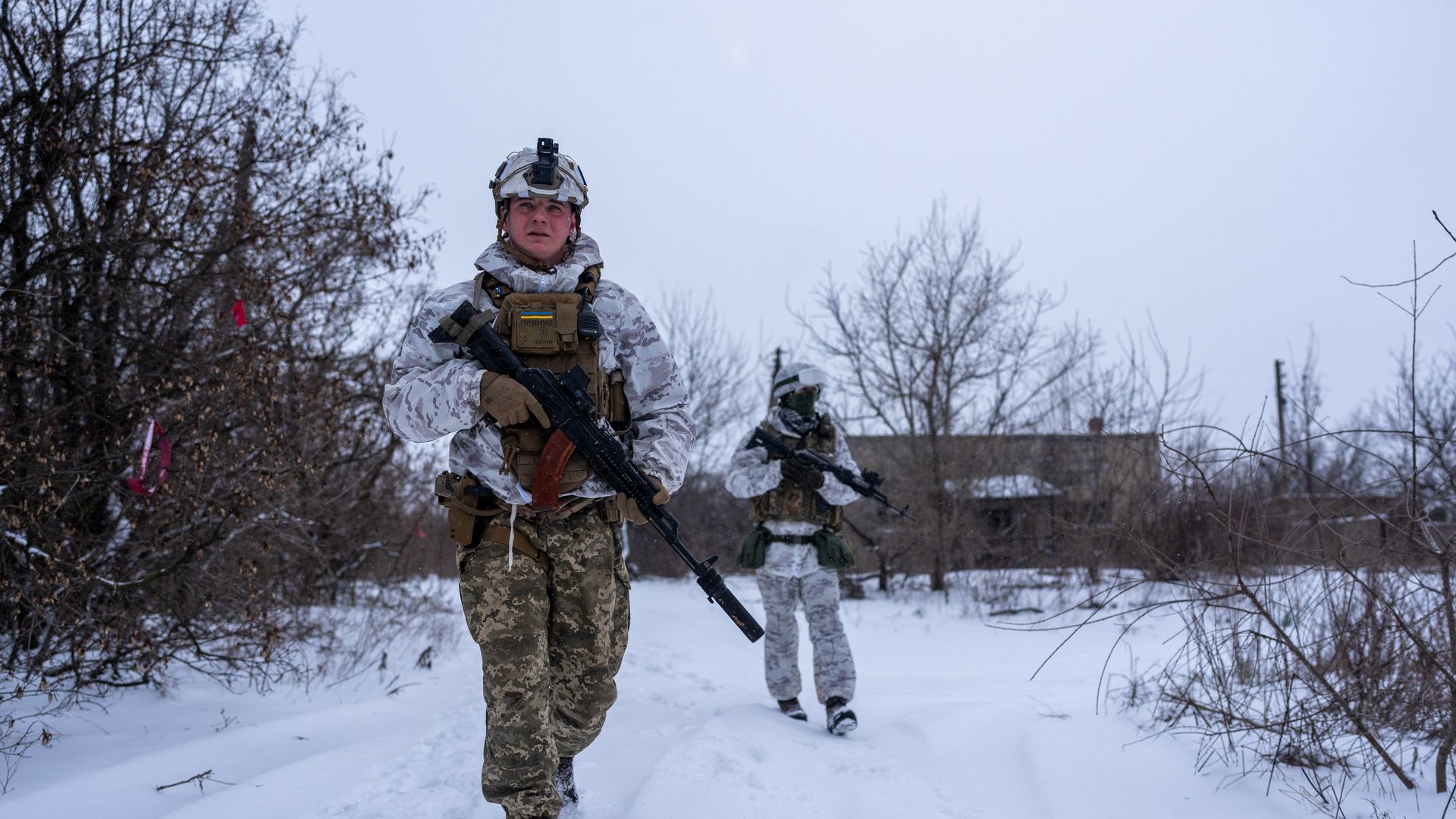 | | | Ukrainian soldiers on patrol in eastern Ukraine. Photo: Wolfgang Schwan/Anadolu Agency via Getty Image | | | | If Putin does invade, Kofman expects Russian artillery and air power to degrade Ukrainian defenses, which have improved since 2014 but are still not a match for Russia's capabilities. The fighting in the early days would be "quite intense," he says. - By the time the tanks started moving, Ukrainian forces near the borders would face a hard choice: "Be encircled or consider organized retreat," he says.
Kofman doesn't expect Russia to "commit to urban warfare," however. Instead, he believes the likely objective would be to occupy a significant amount of territory, or encircle Kyiv, and force a capitulation from the government. He believes the Russian military would expect to be able to accomplish that task fairly quickly. - One key question is whether Russia would limit its operations to eastern Ukraine or attack in the west as well, Kofman says.
- He notes that the Russian military has extensive experience with counter-insurgency campaigns, including in Chechnya, and may be willing to risk a lasting occupation until it gets a friendly government or an enforceable security pact from Kyiv.
|     | | | | | | 3. The view from Kyiv: Preparing, not panicking | 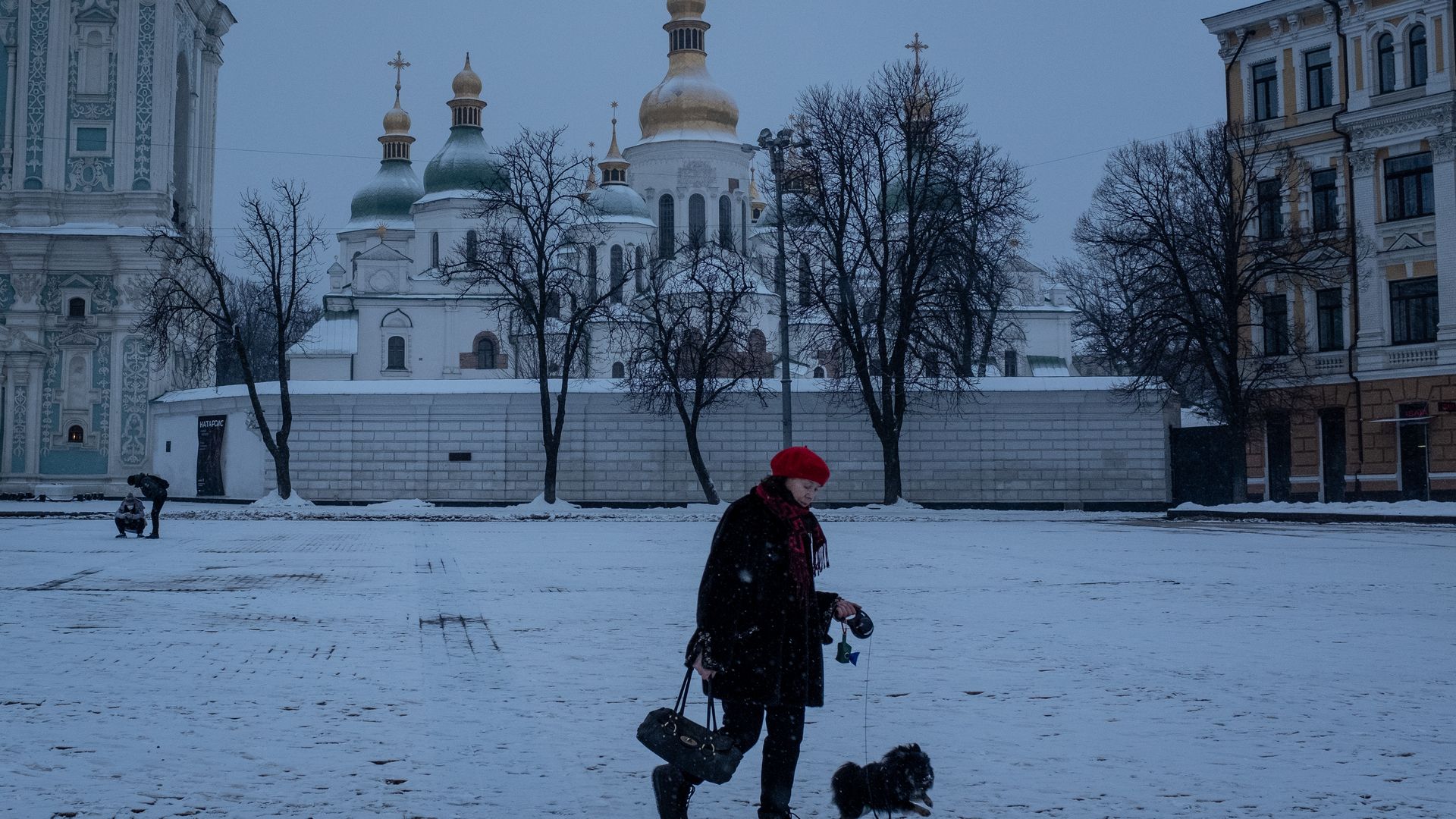 | | | A walk through a snowy Kyiv this evening. Photo: Chris McGrath/Getty Images | | | | There were no signs of panic in Kyiv until the State Department announced Monday that it was evacuating the families of American diplomats, journalist Kristina Zeleniuk emails from Kyiv. - On the ground: "Many of my friends wrote me after the decision of the State Department. They asked if there would be a war, what to do, tried to find out where the bomb shelters were in Kyiv," she writes. But that panic has already receded.
- "We continue to live a normal life. It's a beautiful winter with lots of snow."
While Zeleniuk is skeptical that the U.S. is coordinating as closely with Kyiv as it claims to be, she says Ukrainians are very grateful for the recent weapons shipments from the U.S. and U.K. - The improvements in Ukraine's military since 2014 and the high degree of international support give Ukrainians confidence, she says.
- Yes, but: "The Ukrainian economy is suffering."
The Biden administration has noted that its threat of sanctions and the fear of war have already caused Russia's economy to slide, and Zeleniuk notes that the collective net worth of Russia's billionaires fell by $23 billion in January alone. But Ukrainians are also feeling economic pain. - "The exchange rate of our national currency fell. Fuel and food prices in supermarkets have also risen."
The bottom line: Many Ukrainians consider a new Russian invasion likely, but "we have been living in a state of war with Russia for 8 years," Zeleniuk writes. - "Right now there is no panic. Everyone is ready to defend our land."
|     | | | | | | A message from Axios | | The podcast to power your day. | | |  | | | | Every weekday, host Niala Boodhoo catches you up quick on the latest news and interesting stories you won't hear anywhere else. In 10 minutes, you'll hear the latest in US and world news. Listen now for free. | | | | | | Bonus: Where in the world? | 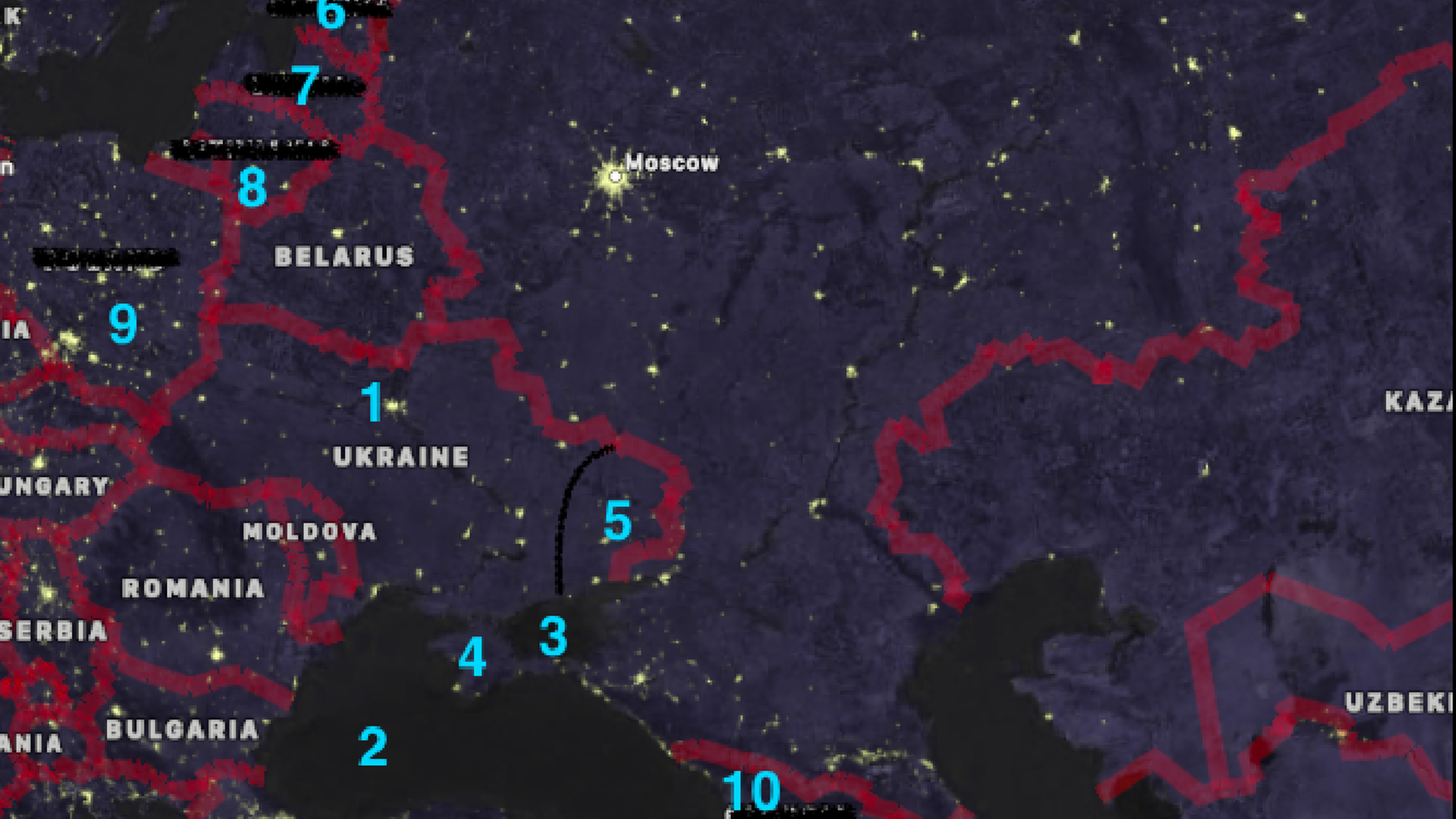 | | | Screenshot via Apple Maps | | | | Today's quiz focuses on some geography we may all be hearing more and more about in the coming weeks. Guide: - 1 is a capital city, 2 and 3 are seas, 4 was annexed in 2014, and 5 was occupied by separatist "republics." (I'll accept their names or the name of the region. Please forgive the rough line.)
- 6–9 are NATO "eastern flank" states, and 10, like Ukraine, would love to join them in the alliance.
|     | | | | | | 4. Data du jour: Where corruption thrives |  Data: Transparency International; Map: Jared Whalen/Axios The most corrupt governments in the world are in South Sudan, Syria and Somalia, according to Transparency International's annual index, while the "cleanest" are in Denmark, Finland and New Zealand. - Breaking it down: The U.S. is ranked the 27th cleanest, China the 66th, India the 85th, Brazil the 96th, and Russia the 136th.
- Details: The index is based on the perceptions of corruption in each country from experts and businesspeople.
- Worth noting: As reader Mark P. points out, the top-three cleanest countries are all led by women.
View the interactive map. |     | | | | | | 5. Global news roundup |  | | | President Xiomara Castro is inaugurated in Honduras. Photo: Inti Oncon/Picture Alliance via Getty Images | | | | 1. Xiomara Castro was inaugurated today as the first female president of Honduras, my Axios Latino colleagues write. - The ceremony took place despite a legislative tussle last week, when rival factions of the ruling party each named different congressional leaderships.
- Outgoing president Juan Orlando Hernández could now face drug trafficking charges in the U.S. — where his brother was convicted in 2018 on similar charges.
2. The European Union launched legal action against China at the World Trade Organization today, accusing Beijing of "discriminatory trade practices" against Lithuania, Axios' Zach Basu writes. - The Baltic country has faced a months-long campaign of intimidation from Beijing for strengthening its ties with Taiwan.
- The decision to refer China to the WTO is an important symbolic intervention by the EU, which had been divided in its response to the coercion of a tiny member state by one of the bloc's largest trading partners.
3. UN Secretary-General António Guterres Wednesday called on the U.S to lift a freeze on at least $8 billion in Afghan central bank assets that is contributing to the country's dire humanitarian crisis. - The Biden administration has been providing humanitarian aid as famine closes in on Afghanistan, but it's refused to cooperate with the Taliban government.
- What they're saying: China's UN ambassador called the freeze "no less lethal than military intervention." U.S. Ambassador to the UN Linda Thomas-Greenfield said the U.S. was considering "various options to ease the liquidity crunch."
4. US-backed Kurdish forces in Syria say they've regained control of a prison where ISIS fighters last week carried out what appeared to be the group's largest-scale attack in three years, per CNN. 5. The Biden administration is considering a plan to dramatically streamline the process of relocating Afghan refugees in the United States, Axios' Stef Kight and Jonathan Swan scoop. |     | | | | | | 6. What I'm reading: "There is nobody to remember" | 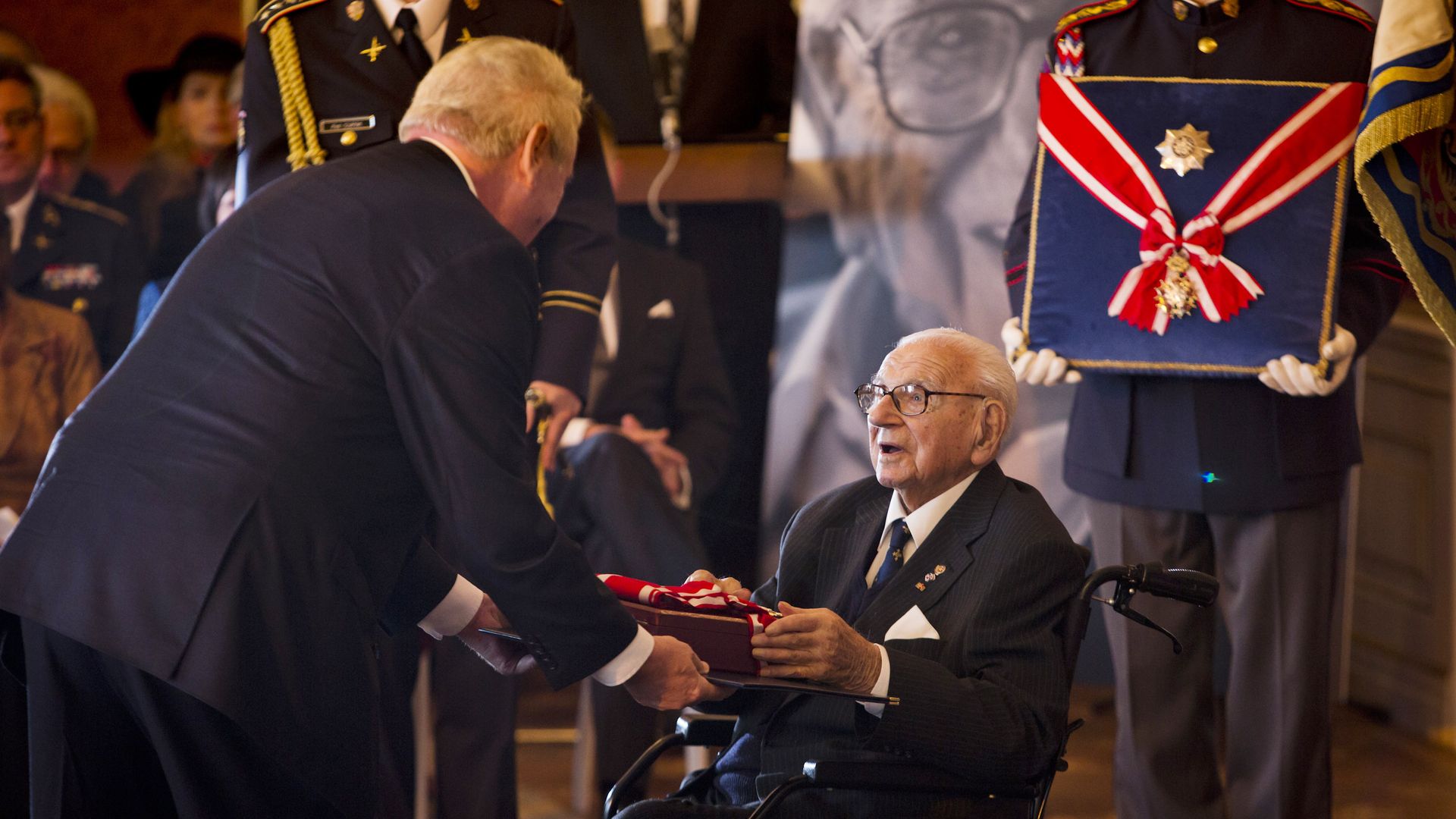 | | | Nicholas Winton receives the Order of White Lion, the highest order of the Czech Republic, from Czech President Milos Zeman, Oct. 28, 2014, in Prague, Czech Republic. Photo: Matej Divizna/Getty Images | | | | I want to pass along two posts marking Holocaust Remembrance Day that stopped me in my tracks as I was pulling together this newsletter. The first, from journalist Hugo Rifkind of the Times of London, tells what's left of the story of Sulamita Szapiro, a teacher from Warsaw who was seven months pregnant when the Nazis invaded in 1939. - She fled to Lviv and was deported to a gulag in Siberia along with her husband, whom she'd only just married. They were freed in 1941 and tried to flee to the West but Sulamita died on the journey, along with their child.
- None of her relatives survived the Holocaust, but her husband did. He was Rifkind's late grandfather.
- "Until I learned of her existence a few years ago, there was not one person in the world left to remember her name, nor to know the name of that child," he writes. "This is what the Holocaust means."
The second was a clip from the BBC that circulates every year but remains one of the most moving pieces of TV I've ever seen. - It's the story of Nicholas Winton, a British man who managed to save 669 Jewish children from Czechoslovakia in the months before the war began.
- Winton kept his heroics to himself for 50 years, until some of the children he'd saved — now adults with families of their own — got the opportunity to thank him.
- Short clip. Full story.
|     | | | | | | 7. Stories we're watching | 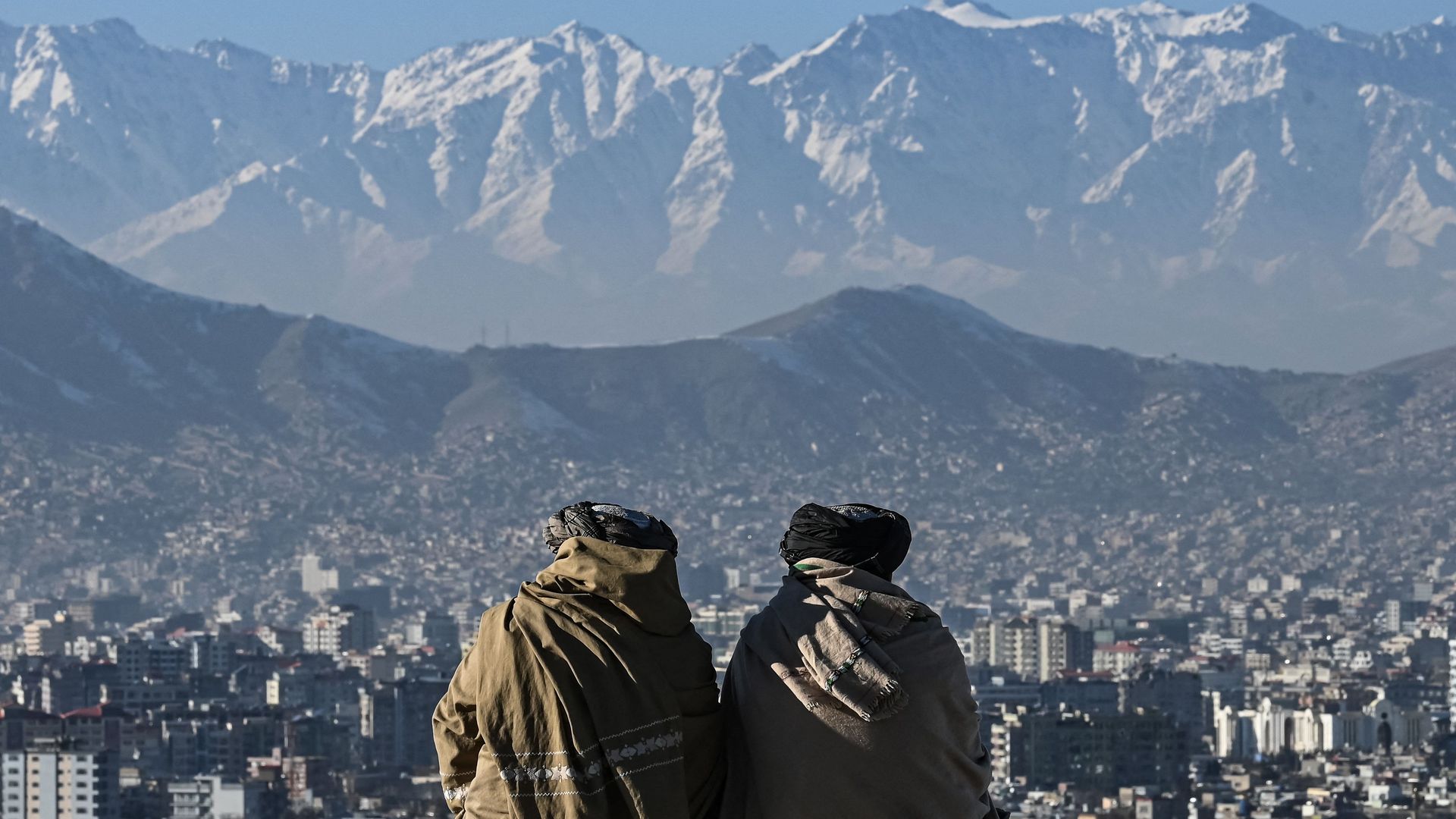 | | | Looking out onto Kabul. Photo: Mohd Rasfan/AFP via Getty | | | - London police investigate lockdown parties on Downing Street
- U.S. and Iran "in the ballpark" of a nuclear deal
- U.S. has shipped 400 million COVID vaccines
- Israel's "top priority" mission to discredit UN probe
- Global spending on energy transition nears $1 trillion
- Australian Open organizers reverse "Where is Peng Shuai?" T-shirt ban
- Your old T-shirt may be in a Chilean desert
Quoted: "We need to find ways to include the whole world to give hope to Africans so that they don't need to cross the Mediterranean in order to find maybe a better life but, more probably, death in the sea." — FIFA president Gianni Infantino seeming to suggest that fewer Africans will attempt a dangerous crossing to Europe if the World Cup is played every two years — a switch that, incidentally, would be a financial windfall for the global soccer body. |     | | | | | | A message from Axios | | The podcast to power your day. | | |  | | | | Every weekday, host Niala Boodhoo catches you up quick on the latest news and interesting stories you won't hear anywhere else. In 10 minutes, you'll hear the latest in US and world news. Listen now for free. | | | | Answers: 1. Kyiv. 2. Black Sea. 3. Sea of Azov. 4. Crimea. 5. Donetsk and Luhansk OR the Donbas. 6. Estonia. 7. Latvia. 8. Lithuania. 9. Poland. 10. Georgia. |  | Bring the strength of Smart Brevity® to your team — more effective communications, powered by Axios HQ. | | | | | | Axios thanks our partners for supporting our newsletters. If you're interested in advertising, learn more here.
Sponsorship has no influence on editorial content. Axios, 3100 Clarendon Blvd, Suite 1300, Arlington VA 22201 | | | You received this email because you signed up for newsletters from Axios.
Change your preferences or unsubscribe here. | | | Was this email forwarded to you?
Sign up now to get Axios in your inbox. | | | | Follow Axios on social media:    | | | | | |
Post a Comment
0Comments